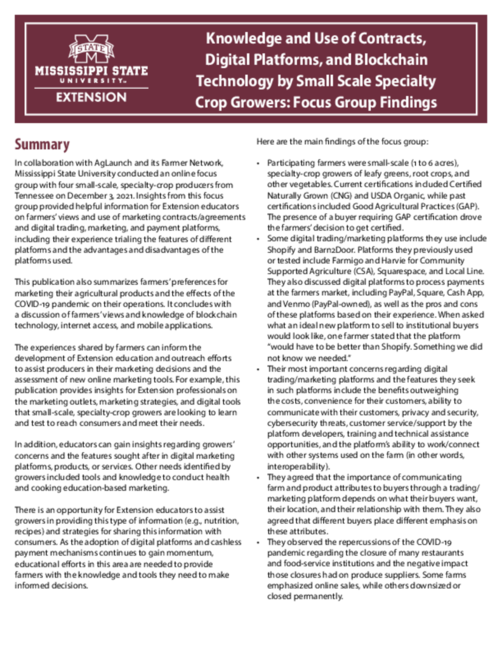P3752
Knowledge and Use of Contracts, Digital Platforms, and Blockchain Technology by Small Scale Specialty Crop Growers: Focus Group Findings
Download the PDF above for the complete publication.
In collaboration with AgLaunch and its Farmer Network, Mississippi State University conducted an online focus group with four small-scale, specialty-crop producers from Tennessee on December 3, 2021. Insights from this focus group provided helpful information for Extension educators on farmers’ views and use of marketing contracts/agreements and digital trading, marketing, and payment platforms, including their experience trialing the features of different platforms and the advantages and disadvantages of the platforms used.
This publication also summarizes farmers’ preferences for marketing their agricultural products and the effects of the COVID-19 pandemic on their operations. It concludes with a discussion of farmers’ views and knowledge of blockchain technology, internet access, and mobile applications.
The experiences shared by farmers can inform the development of Extension education and outreach efforts to assist producers in their marketing decisions and the assessment of new online marketing tools. For example, this publication provides insights for Extension professionals on the marketing outlets, marketing strategies, and digital tools that small-scale, specialty-crop growers are looking to learn and test to reach consumers and meet their needs.
In addition, educators can gain insights regarding growers’ concerns and the features sought after in digital marketing platforms, products, or services. Other needs identified by growers included tools and knowledge to conduct health and cooking education-based marketing.
There is an opportunity for Extension educators to assist growers in providing this type of information (e.g., nutrition, recipes) and strategies for sharing this information with consumers. As the adoption of digital platforms and cashless payment mechanisms continues to gain momentum, educational efforts in this area are needed to provide farmers with the knowledge and tools they need to make informed decisions.
Here are the main findings of the focus group:
- Participating farmers were small-scale (1 to 6 acres), specialty-crop growers of leafy greens, root crops, and other vegetables. Current certifications included Certified Naturally Grown (CNG) and USDA Organic, while past certifications included Good Agricultural Practices (GAP). The presence of a buyer requiring GAP certification drove the farmers’ decision to get certified.
- Some digital trading/marketing platforms they use include Shopify and Barn2Door. Platforms they previously used or tested include Farmigo and Harvie for Community Supported Agriculture (CSA), Squarespace, and Local Line. They also discussed digital platforms to process payments at the farmers market, including PayPal, Square, Cash App, and Venmo (PayPal-owned), as well as the pros and cons of these platforms based on their experience. When asked what an ideal new platform to sell to institutional buyers would look like, one farmer stated that the platform “would have to be better than Shopify. Something we did not know we needed.”
- Their most important concerns regarding digital trading/marketing platforms and the features they seek in such platforms include the benefits outweighing the costs, convenience for their customers, ability to communicate with their customers, privacy and security, cybersecurity threats, customer service/support by the platform developers, training and technical assistance opportunities, and the platform’s ability to work/connect with other systems used on the farm (in other words, interoperability).
- They agreed that the importance of communicating farm and product attributes to buyers through a trading/marketing platform depends on what their buyers want, their location, and their relationship with them. They also agreed that different buyers place different emphasis on these attributes.
- They observed the repercussions of the COVID-19 pandemic regarding the closure of many restaurants and food-service institutions and the negative impact those closures had on produce suppliers. Some farms emphasized online sales, while others downsized or closed permanently.
- They use or had used verbal or informal agreements instead of written or formal contracts. Key contract attributes include quality and processing specifications, payment method and turnaround, delivery and packaging requirements, delivery time, a guaranteed purchase, a guaranteed minimum price, and penalties for non-fulfillment. If formal contracts were an option, these would be important if they were selling higher volumes to wholesalers, selling to buyers with whom they did not have an established trust relationship, or if the transaction involved custom product requests for which they had to considerably invest additional time and resources. Depending on the parties’ risk tolerance, the higher their perceived risk from these transactions, the more they would favor formal contracts.
- The farmers had heard about blockchain before, but their level of familiarity ranged from minimal to very familiar. After learning more about blockchain and smart contracts, most farmers expressed that they would feel comfortable using blockchain ledgers to store their information but thought the technology might be better suited for transactions with institutional buyers.
- Their concerns about blockchain applications in agriculture and food supply chains included a need for a better understanding of these applications and their problem-solving capabilities, the cost and transaction fees, and long-term sustainability.
- They expressed comfort using mobile applications in general. However, all farmers viewed internet access as an issue for rural and urban locations.
You can also contact state Extension specialists or your local Extension office for answers to specific questions.
The information given here is for educational purposes only. References to commercial products, trade names, or suppliers are made with the understanding that no endorsement is implied and that no discrimination against other products or suppliers is intended.
Publication 3752 (POD-06-25)
By Elizabeth Canales, PhD, Associate Professor, Agricultural Economics, and Alba J. Collart, PhD, former Associate Extension Professor.
